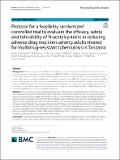Files in this item
Protocol for a feasibility randomized controlled trial to evaluate the efficacy, safety and tolerability of N-acetylcysteine in reducing adverse drug reactions among adults treated for multidrug-resistant tuberculosis in Tanzania
Item metadata
| dc.contributor.author | Mpagama, Stellah G. | |
| dc.contributor.author | Mvungi, Happiness C. | |
| dc.contributor.author | Mbelele, Peter M. | |
| dc.contributor.author | Semvua, Hadija H. | |
| dc.contributor.author | Liyoyo, Alphonce A. | |
| dc.contributor.author | de Guex, Kristen Petros | |
| dc.contributor.author | Sloan, Derek | |
| dc.contributor.author | Kibiki, Gibson S. | |
| dc.contributor.author | Boeree, Martin | |
| dc.contributor.author | Phillips, Patrick P. J. | |
| dc.contributor.author | Heysell, Scott K. | |
| dc.date.accessioned | 2023-04-03T16:30:04Z | |
| dc.date.available | 2023-04-03T16:30:04Z | |
| dc.date.issued | 2023-04-01 | |
| dc.identifier | 283970754 | |
| dc.identifier | 46abc29b-8001-4b0c-9f7f-46d1fd71b57a | |
| dc.identifier | 85153083549 | |
| dc.identifier.citation | Mpagama , S G , Mvungi , H C , Mbelele , P M , Semvua , H H , Liyoyo , A A , de Guex , K P , Sloan , D , Kibiki , G S , Boeree , M , Phillips , P P J & Heysell , S K 2023 , ' Protocol for a feasibility randomized controlled trial to evaluate the efficacy, safety and tolerability of N-acetylcysteine in reducing adverse drug reactions among adults treated for multidrug-resistant tuberculosis in Tanzania ' , Pilot and Feasibility Studies , vol. 9 , 55 . https://doi.org/10.1186/s40814-023-01281-7 | en |
| dc.identifier.issn | 2055-5784 | |
| dc.identifier.other | RIS: urn:A8559343FB13685C868048A36401C796 | |
| dc.identifier.other | RIS: Mpagama2023 | |
| dc.identifier.other | ORCID: /0000-0002-7888-5449/work/132764489 | |
| dc.identifier.uri | https://hdl.handle.net/10023/27325 | |
| dc.description | Funding: This study receives financial supports from the European and Developed Countries Clinical Trials Partnership (EDCTP2) program supported by the European Union project through the Senior Fellowship Scheme TMA1463 awarded to Stellah G Mpagama. | en |
| dc.description.abstract | Background Adverse drug reactions (ADRs) frequently occur in patients using second-line anti-tuberculosis medicine for treatment of multidrug resistant tuberculosis (MDR-TB). ADRs contribute to treatment interruptions which can compromise treatment response and risk acquired drug resistance to critical newer drugs such as bedaquiline, while severe ADRs carry considerable morbidity and mortality. N-acetylcysteine (NAC) has shown promise in reducing ADRs for medications related to TB in case series or randomized controlled trials in other medical conditions, yet evidence is lacking in MDR-TB patients. TB endemic settings have limited capacity to conduct clinical trials. We designed a proof-of-concept clinical trial primarily to explore the preliminary evidence on the protective effect of NAC among people treated for MDR-TB with second-line anti-TB medications. Methods This is a proof-of-concept randomized open label clinical trial with 3 treatment arms including a control arm, an interventional arm of NAC 900 mg daily, and an interventional arm of NAC 900 mg twice-daily administered during the intensive phase of MDR-TB treatment. Patients initiating MDR-TB treatment will be enrolled at Kibong’oto National Center of Excellence for MDR-TB in the Kilimanjaro region of Tanzania. The minimum anticipated sample size is 66; with 22 participants in each arm. ADR monitoring will be performed at baseline and daily follow-up over 24 weeks including blood and urine specimen collection for hepatic and renal function and electrolyte abnormalities, and electrocardiogram. Sputum will be collected at baseline and monthly thereafter and cultured for mycobacteria as well as assayed for other molecular targets of Mycobacterium tuberculosis. Adverse drug events will be analysed over time using mixed effect models. Mean differences between arms in change of the ADRs from baseline (with 95% confidence intervals) will be derived from the fitted model. Discussion Given that NAC promotes synthesis of glutathione, an intracellular antioxidant that combats the impact of oxidative stress, it may protect against medication induced oxidative damage in organs such as liver, pancreas, kidney, and cells of the immune system. This randomized controlled trial will determine if NAC leads to fewer ADRs, and if this protection is dose dependent. Fewer ADRs among patients treated with MDR-TB may significantly improve treatment outcomes for multidrug regimens that necessitate prolonged treatment durations. Conduct of this trial will set the needed infrastructure for clinical trials. | |
| dc.format.extent | 13 | |
| dc.format.extent | 1649416 | |
| dc.language.iso | eng | |
| dc.relation.ispartof | Pilot and Feasibility Studies | en |
| dc.subject | Multidrug-resistant tuberculosis | en |
| dc.subject | Adverse drug reactions | en |
| dc.subject | N-acetylcyteine | en |
| dc.subject | Drug-induced Liver injury | en |
| dc.subject | Clinical trial | en |
| dc.subject | RA0421 Public health. Hygiene. Preventive Medicine | en |
| dc.subject | RM Therapeutics. Pharmacology | en |
| dc.subject | T-NDAS | en |
| dc.subject | SDG 3 - Good Health and Well-being | en |
| dc.subject | MCC | en |
| dc.subject.lcc | RA0421 | en |
| dc.subject.lcc | RM | en |
| dc.title | Protocol for a feasibility randomized controlled trial to evaluate the efficacy, safety and tolerability of N-acetylcysteine in reducing adverse drug reactions among adults treated for multidrug-resistant tuberculosis in Tanzania | en |
| dc.type | Journal article | en |
| dc.contributor.institution | University of St Andrews. School of Medicine | en |
| dc.contributor.institution | University of St Andrews. Infection and Global Health Division | en |
| dc.identifier.doi | 10.1186/s40814-023-01281-7 | |
| dc.description.status | Peer reviewed | en |
This item appears in the following Collection(s)
Items in the St Andrews Research Repository are protected by copyright, with all rights reserved, unless otherwise indicated.

